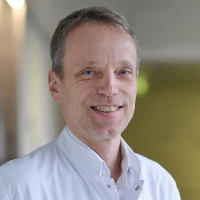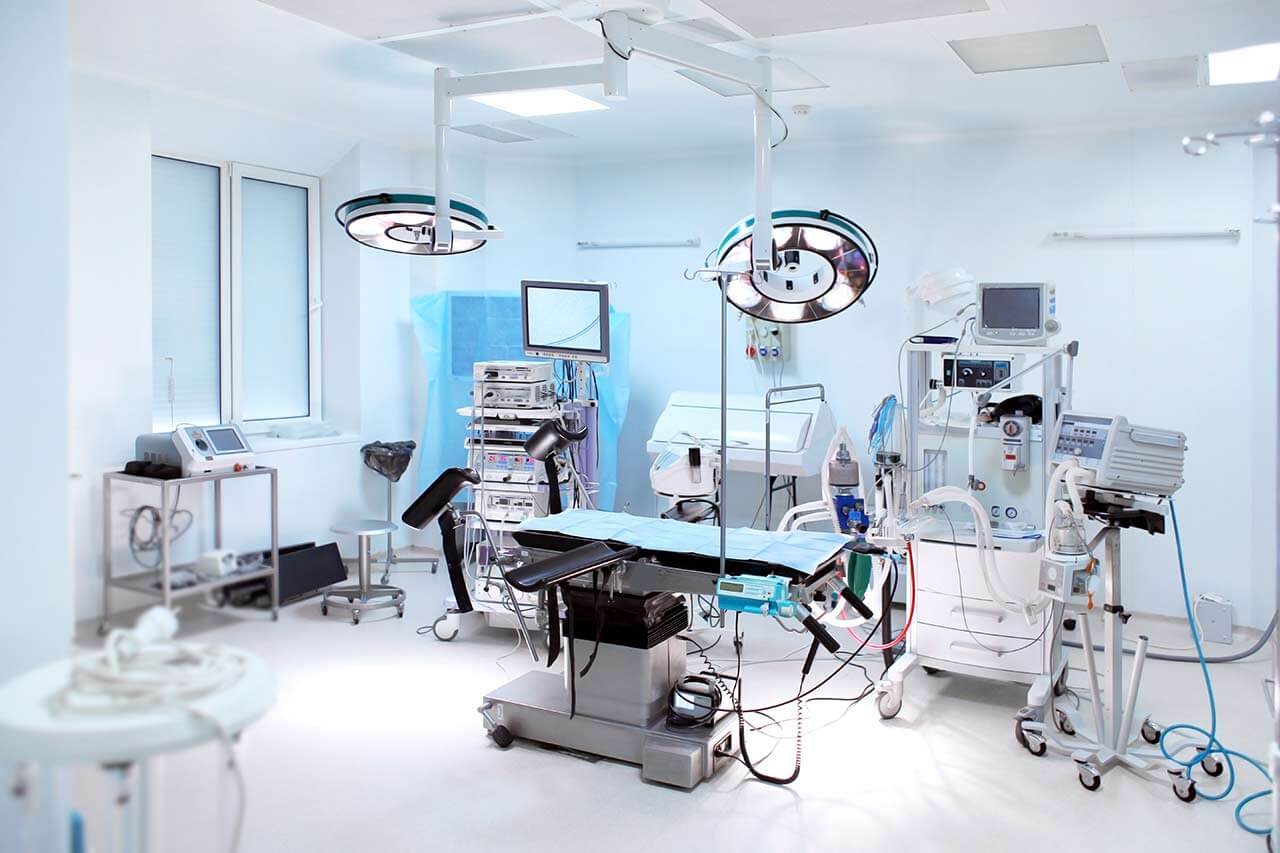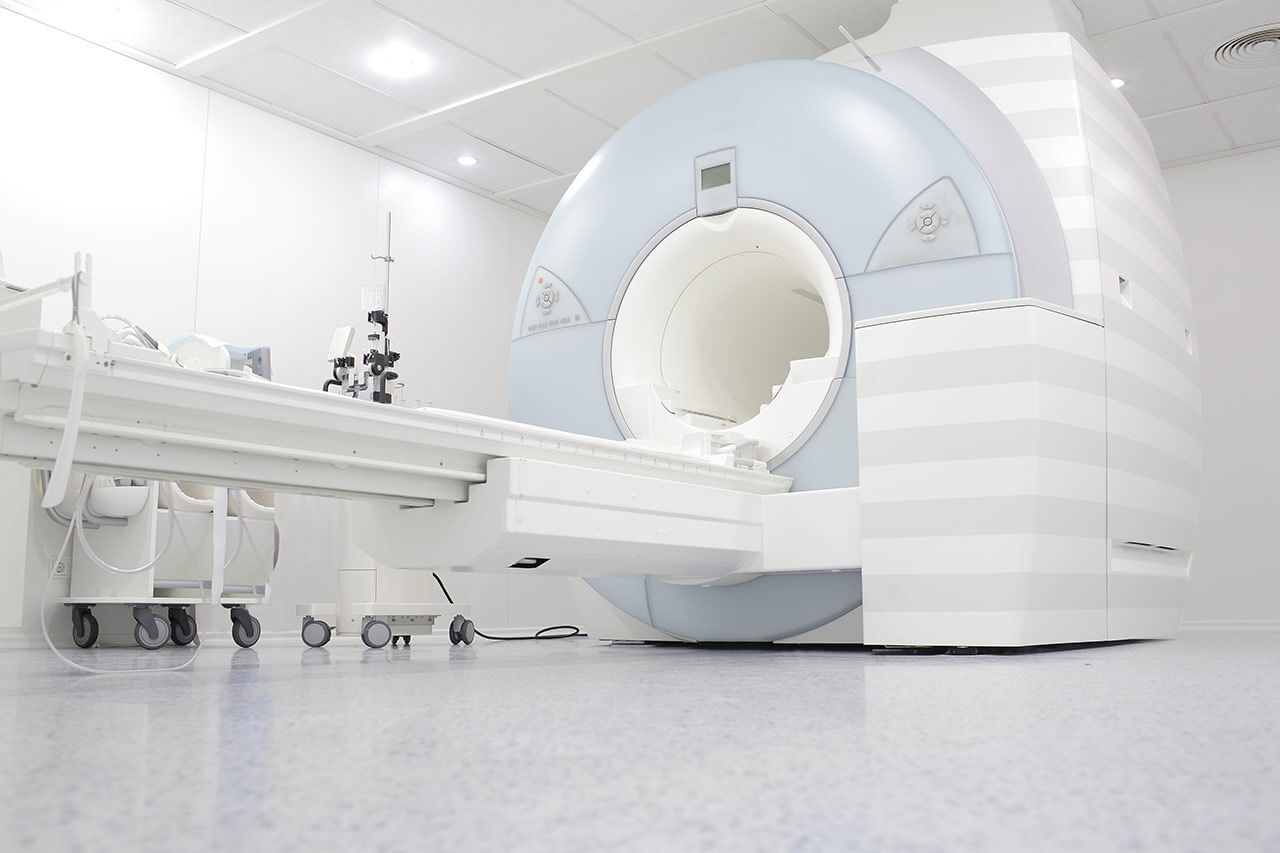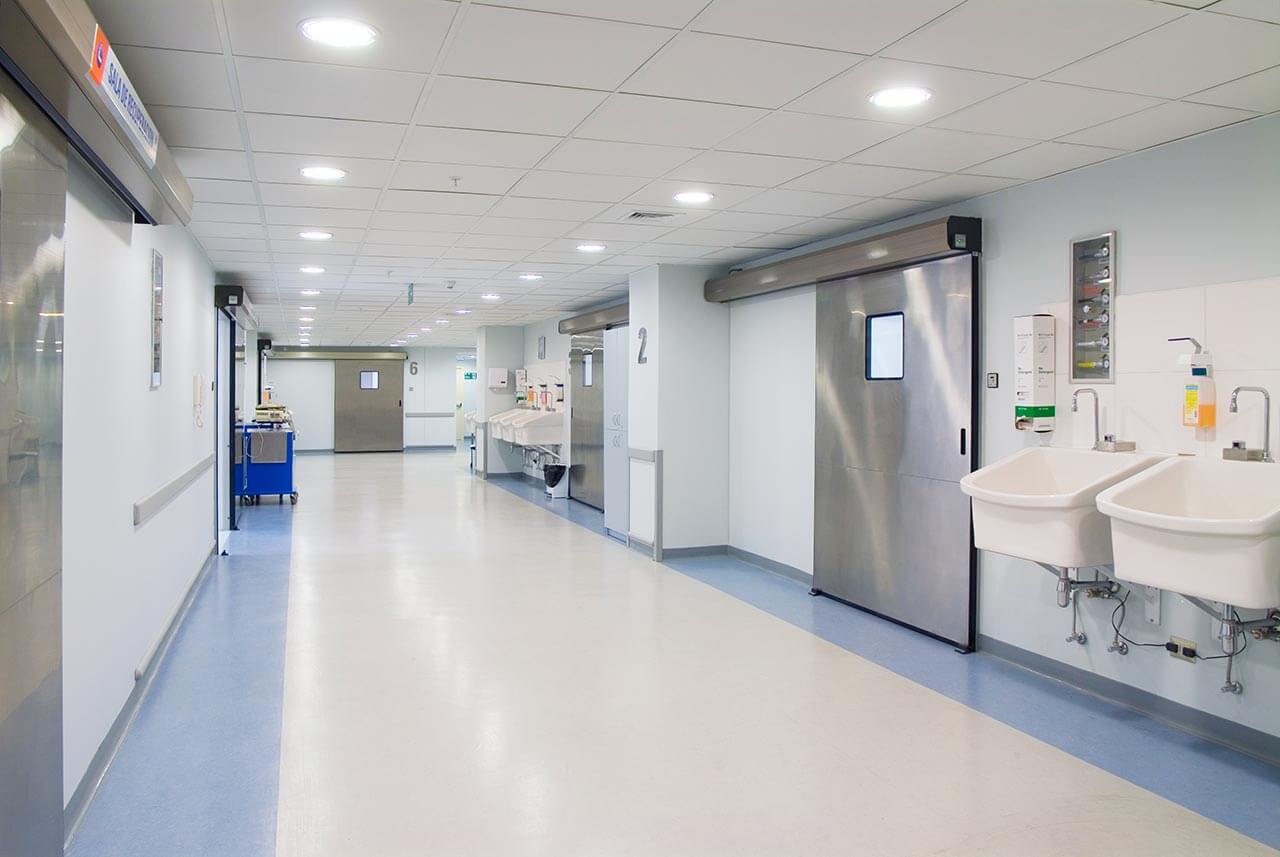
The program includes:
- Initial presentation in the clinic
- clinical history taking
- physical examination
- laboratory tests:
- complete blood count
- biochemical blood analysis
- metabolic analysis of blood
- cardiovascular disease risk markers
- inflammation indicators (CRP, ESR)
- indicators of blood coagulation
- doppler/duplex scanning of lower extremity vessels
- angiography or angio MRI (on indication 1200 €)
- nursing services
- consultation of all leading experts
- development of individual treatment plan
- written statement
Required documents
- Medical records (if availale)
Service
You may also book:
 BookingHealth Price from:
BookingHealth Price from:
About the department
The Department of General and Abdominal Surgery, Hernia Surgery, Vascular Surgery, Endocrine Surgery and Bariatric Surgery at the University Hospital Halle (Saale) offers a full range of surgical treatments in its areas of specialization at the highest level of university medicine. The department operates on patients with abdominal cancers, with a special focus on stomach, esophageal, colon, pancreatic, and liver cancers, inflammatory gastrointestinal diseases, hernias, and vascular diseases, as well as pathologies of the thyroid gland, parathyroid glands, adrenal glands, and neuroendocrine tumors. The department is certified in accordance with the standards of the German Cancer Society (DKG) for its high success rates in the surgical treatment of oncological diseases and has also been awarded the DGH Siegel certificate by the German Hernia Society. The department presents the direction of bariatric surgery, whose specialists excel in the treatment of morbid obesity with procedures such as gastric bypass, gastric banding, sleeve gastroplasty, and biliopancreatic diversion with duodenal switch. In their clinical practice, the department's surgeons mainly use modern minimally traumatic surgical techniques. The department performs minimally invasive, robotic (da Vinci Si® and Xi® systems), and endovascular surgery. It is important to the specialists at the medical facility to provide each patient with the best therapeutic results with a high degree of safety. The Head Physician of the department is Prof. Dr. med. Jörg Kleeff.
The medical team of the department strives to keep up with the innovations in the world of surgery, so the most modern operations are performed here, which allow to provide effective medical care in complex clinical cases. One of such operations is cytoreductive surgery in combination with hyperthermic intraperitoneal chemotherapy (HIPEC). The method is used to treat peritoneal carcinomatosis, which is a complication of colon cancer, stomach cancer, appendiceal cancer, as well as pseudomyxoma or peritoneal mesothelioma. Surgical treatment consists of two stages: the doctors of the department first perform surgical resection of all visible tumor foci on the peritoneum, and then the HIPEC procedure is performed, during which the abdominal cavity is rinsed with a solution of chemotherapy drugs heated to high temperatures (42℃ and above) for 60-90 minutes. The effect of highly concentrated cytostatics in combination with the hyperthermia effect allows for maximum destruction of cancer cells in the abdominal cavity, which is impossible with classical systemic chemotherapy. Thus, HIPEC ensures the destruction of microscopic tumor foci remaining after resection, which carry a high risk of cancer recurrence. Cytoreductive surgery with HIPEC is an innovative treatment method whose effectiveness is internationally recognized. This treatment requires state-of-the-art equipment and high professional skills of surgeons, therefore it is performed only in the world's best hospitals. It should be noted that the surgeons of the department regularly practice the treatment of peritoneal carcinomatosis with the HIPEC method and demonstrate excellent results in this area.
The department also offers treatment with pressurized intraperitoneal aerosol chemotherapy (PIPAC), a procedure in which chemotherapy drugs are administered into the abdominal cavity in the form of an aerosol under pressure. Indications for PIPAC include peritoneal carcinomatosis due to colorectal, gastric or appendiceal cancers, pseudomyxoma, and peritoneal mesothelioma. Unlike HIPEC, pressurized intraperitoneal aerosol chemotherapy is performed laparoscopically, without the stage of tumor resection surgery. PIPAC can be used as a stand-alone method, in combination with systemic chemotherapy, and as a neoadjuvant treatment prior to cytoreductive surgery with HIPEC. Pressurized intraperitoneal aerosol chemotherapy is performed under general anesthesia and lasts approximately one hour. PIPAC is highly effective, well tolerated, and has virtually no side effects. In addition, PIPAC can be used repeatedly.
The department's team of surgeons is deservedly proud of its unique experience in robotic surgery. Minimally invasive surgery is successfully performed here using the advanced da Vinci Si® and Xi® robotic systems, which allow surgeons to operate on abdominal organs with minimal trauma and high precision; the robotic equipment features the latest generation of three-dimensional optics. When performing surgery, the surgeon controls and commands the robotic system from a control console. The surgeon can view the surgical field in multiple zooms, and the manipulator arms of the da Vinci robot with built-in miniature instruments perform the most complex surgical maneuvers in hard-to-reach areas without damaging nerve endings and blood vessels. The effectiveness of da Vinci operations is comparable to the results of classic open operations, but the robot offers a number of advantages such as minimal blood loss, barely noticeable scars, a short postoperative recovery period, and a low risk of postoperative complications. The department's physicians are highly skilled in robotic surgery for procedures involving the stomach, esophagus, intestines, pancreas, liver, gallbladder, and bile ducts.
An important area of clinical activity of the department is hernia repair surgery. In this field, the medical facility has been awarded the DGH Siegel quality certificate by the German Hernia Society. The department specializes in inguinal and umbilical hernia repair surgery. In most cases, the department's surgeons prefer minimally invasive techniques with the placement of mesh implants. For example, transabdominal preperitoneal hernioplasty (TAPP) or total extraperitoneal hernioplasty (TEP) are successfully performed here to treat inguinal hernias, and intraperitoneal onlay mesh (IPOM) is used to repair umbilical hernias. In complex clinical cases, specialists resort to open surgery such as Lichtenstein or Shouldice hernioplasty procedures.
The medical services provided by the department include the following:
- General and abdominal surgery
- Surgery for oncological diseases of the gastrointestinal tract
- Surgery for colon cancer
- Surgery for stomach cancer
- Surgery for esophageal cancer
- Surgery for pancreatic cancer
- Surgery for peritoneal carcinomatosis: innovative HIPEC and PIPAC methods
- Surgery for hepatocellular carcinoma
- Surgery for liver metastases
- Surgery for gallbladder and bile duct cancer
- Surgery for chronic inflammatory bowel disease
- Surgery for gastroesophageal reflux disease, including in combination with diaphragmatic hernia and displacement of the stomach into the chest
- Surgery for oncological diseases of the gastrointestinal tract
- Hernia surgery
- Inguinal hernia repairs: transabdominal preperitoneal hernia repair (TAPP), totally extraperitoneal hernia repair (TEP), and Lichtenstein or Shouldice hernia repair
- Umbilical hernia repairs: intraperitoneal onlay mesh (IPOM)
- Vascular surgery
- Open surgery and endovascular stenting for aneurysms, aortic dissection, and abdominal aortic branch occlusion
- Open surgery and endovascular stenting for carotid artery stenosis (stroke prevention)
- Surgery for stenosis and occlusion of the blood vessels in the lower extremity due to peripheral arterial occlusive disease
- Dialysis access formation, including revision procedures
- Surgery for dialysis fistulas, defects after continuous use of catheters, etc.
- Surgery for congenital arteriovenous malformations
- Surgery for for varicose veins and thrombosis
- Endocrine surgery
- Surgery for benign thyroid diseases
- Surgery for diffuse and nodular goiter
- Surgery for thyrotoxicosis
- Surgery for cold thyroid nodules
- Surgery for malignant thyroid diseases
- Surgery for thyroid cancer
- Surgery for adrenal diseases
- Surgery for adrenal hyperfunction
- Surgery for adrenal hyperplasia
- Surgery for rare malignant tumors of the adrenal glands
- Surgery for Cushing's syndrome
- Surgery for hyperaldosteronism
- Surgery for parathyroid diseases
- Surgery for hyperparathyroidism in parathyroid adenoma
- Surgery for rare malignant tumors of the parathyroid glands
- Surgery for neuroendocrine tumors
- Surgery for benign thyroid diseases
- Bariatric surgery
- Gastric bypass
- Gastric banding
- Sleeve gastrectomy
- Biliopancreatic diversion with duodenal switch
- Other surgical options
The department performs operations using the following surgical techniques:
- Minimally invasive surgical techniques
- Endoscopic techniques
- Endovascular techniques
- Robotic techniques (da Vinci Si® and Xi® systems)
- Other surgical techniques
Curriculum vitae
Higher Education
- 1990 - 1992 Medical studies, Faculty of Medicine, Eberhard Karls University Tuebingen.
- 1992 - 1996 Medical studies, Faculty of Medicine, Ludwig Maximilian University of Munich.
- 1997 Thesis defense, Ludwig Maximilian University of Munich. Subject: "Diagnostic methods and epidemiology of HTLV-I and II viruses in Germany".
- 2005 Habilitation, Ruprecht Karls University of Heidelberg. Subject: "Mechanisms of pancreatic carcinoma aggressiveness at the molecular level – TGF-b signaling pathway".
- 2010 Extraordinary Professorship, Technical University of Munich.
Internships Abroad
- 1994 University of Washington, Murray Korc Laboratory, Seattle, USA.
- 1995 Harvard University, Boston, USA.
- 1996 Inselspital, University of Bern, Switzerland.
- 1996 University of Toronto, Canada.
Qualifications
- Board certification in General, Abdominal and Special Abdominal Surgery.
- 2011 Master of Healthcare Business Administration (MHBA), Friedrich-Alexander University Erlangen-Nuremberg.
Professional Career
- 1999 - 2005 Assistant Physician, Department of Abdominal Surgery and Transplant Surgery, Inselspital, University of Bern, Switzerland, and Department of General and Abdominal Surgery and Traumatology, University Hospital Heidelberg.
- 2005 - 2008 Senior Physician, Department of General and Abdominal Surgery and Traumatology, University Hospital Heidelberg, as well as the Department of Surgery at the University Hospital Rechts der Isar Munich.
- 2009 - 2015 Managing Senior Physician, Department of Surgery, University Hospital Rechts der Isar Munich.
- 2013 - 2014 Acting Head of the Department of Surgery, University Hospital Rechts der Isar Munich.
- 2015 - 2016 Consultant for Pancreatohepatobiliary and General Surgery, Royal Liverpool and Broadgreen Hospitals, Liverpool, UK.
- 2015 - 2020 Honorary Professorship, Department of Molecular and Clinical Oncology, Institute of Translational Medicine, University of Liverpool, UK.
- Since 2017 Professorship for Abdominal Surgery and Head Physician, Department of General and Abdominal Surgery, Hernia Surgery, Vascular Surgery, Endocrine Surgery and Bariatric Surgery, University Hospital Halle (Saale).
- Since 2017 Head Physician, Department of General, Abdominal and Vascular Surgery, Bergmannstrost Hospital in Halle.
Honorary Titles
- Honorary Professor of the R. E. Kavetsky Institute of Experimental Pathology, Oncology and Radiobiology of the National Academy of Sciences of Ukraine.
- Associate Clinical Professor, Tufts University School of Medicine, Boston, USA.
- Fellow of the American Gastroenterological Association (AGAF).
- Fellow of the American College of Surgeons (FACS).
- Fellow of the Royal College of Surgeons (FRCS).
Memberships in Professional Societies
- American Gastroenterological Association (AGA).
- American Pancreatic Association (APA).
- Asian-Pacific Hepato-Pancreato-Biliary Association (A-PHPBA).
- Professional Association of German Surgeons (BDC).
- British Medical Association (BMA).
- German Society of General and Visceral Surgery (DGAV).
- German Society of Surgery (DGCH).
- German Society for Gastroenterology, Digestive and Metabolic Diseases (DGVS).
- German Pancreatic Club (DPC).
- European Digestive Surgery (EDS).
- European-African Hepato-Pancreato-Biliary Association (E.AHPBA).
- European Neuroendocrine Tumor Society (ENETS).
- European Pancreatic Club (EPC).
- European Surgical Association (ESA).
- International Association of Pancreatology (IAP).
- International Hepato-Pancreato-Biliary Association (IHPBA).
- Society for Surgery of the Alimentary Tract (SSAT).
- Association of Bavarian Surgeons (VBC).
Photo of the doctor: (c) Universitätsklinikum Halle (Saale)
About hospital
According to the prestigious Focus magazine, the University Hospital Halle (Saale) is one of the best medical institutions in Germany!
The history of the hospital goes back more than 300 years, and during this time it has managed to gain an excellent reputation not only in Germany, but also throughout the world. The hospital positions itself as a specialized healthcare facility for the treatment of severe and rare diseases and injuries. The hospital provides medical care to patients of all ages in compliance with the latest scientific achievements. The hospital is distinguished by successful research activities, especially in the field of cardiovascular diseases and oncopathologies – the specialists in these areas have made significant contributions to the development of the very latest diagnostic methods and therapeutic approaches.
The University Hospital Halle (Saale) has 30 specialized departments representing almost all areas of modern medicine, as well as 17 narrowly focused institutes. About 35,000 patients receive qualified medical care of European standards in the hospital every year, and more than 212,000 patients are served on an outpatient basis. This number of patients is evidence of the high efficiency of medical services and the excellent image of the hospital in the international medical arena; patients from all over the world regularly seek medical attention here.
Some of the hospital's structural units deserve special attention. For example, the Central Emergency Department (the largest in Saxony-Anhalt), modern dental clinics, the Perinatal Center, and the Transplant Center, which has a history of more than 40 years. The Transplant Center performs more than 40 kidney transplants annually, most of them from living donors.
Thanks to the use of the latest medical technologies and the availability of state-of-the-art equipment, many previously high-risk surgeries and procedures can now be performed in the hospital using sparing techniques. In this context, hybrid cardiac surgery and robotic surgery using the innovative da Vinci Si® system in urology are worthy of mention.
An integral part of the successful clinical practice of the University Hospital Halle (Saale) is the availability of experienced and competent medical staff. The total number of employees at the hospital is more than 4,450. Many physicians are known far beyond the borders of Germany: they regularly conduct important research that enables the development of modern medicine. In addition, the hospital specializes in training medical students, so qualified doctors and professors are willing to pass on their experience to the younger generation.
The hospital has many quality certificates such as DIN EN ISO 9001:2015 certificate, German Cancer Society (DKG) certificate, JACIE certificate, EndoCert certificate, ClarCert certificate, German Spine Society (DWG) certificate, German Trauma Society (DGU) certificate, CERT iQ certificate, LGA InterCetert certificate, and others.
Photo: (с) depositphotos
Accommodation in hospital
Patients rooms
The patients of the University Hospital Halle (Saale) stay in comfortable single, double, and triple rooms with a modern design. All patient rooms have an ensuite bathroom with a toilet and a shower. The standard patient room includes a comfortable automatically adjustable bed, a bedside table, a wardrobe, a table and chairs for receiving visitors, a TV, a radio, and a telephone. The patient rooms have access to Wi-Fi. For safety reasons, the use of laptops and cell phones is prohibited in some areas, including the intensive care units. The hospital also offers enhanced-comfort patient rooms.
Meals and Menus
The hospital offers delicious and well-balanced meals three times a day: breakfast, lunch, and dinner. Patients and their companions can choose from three daily menus, which always include dietary dishes. If necessary, an individual menu can be prepared for the patient. Children are offered a special menu with healthy and tasty dishes, rich in nutrients necessary for a growing body.
Further details
Standard rooms include:
![]() Toilet
Toilet
![]() Shower
Shower
![]() Wi-Fi
Wi-Fi
![]() TV
TV
Religion
Religious services are available upon request.
Accompanying person
Your accompanying person may stay with you in your patient room or at the hotel of your choice during the inpatient program.
Hotel
Your accompanying person may stay with you in your patient room or at the hotel of your choice during the inpatient program.




